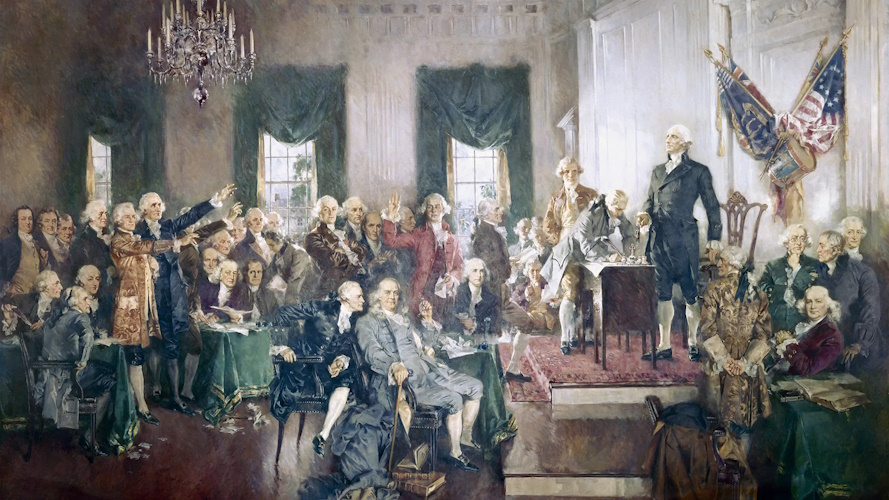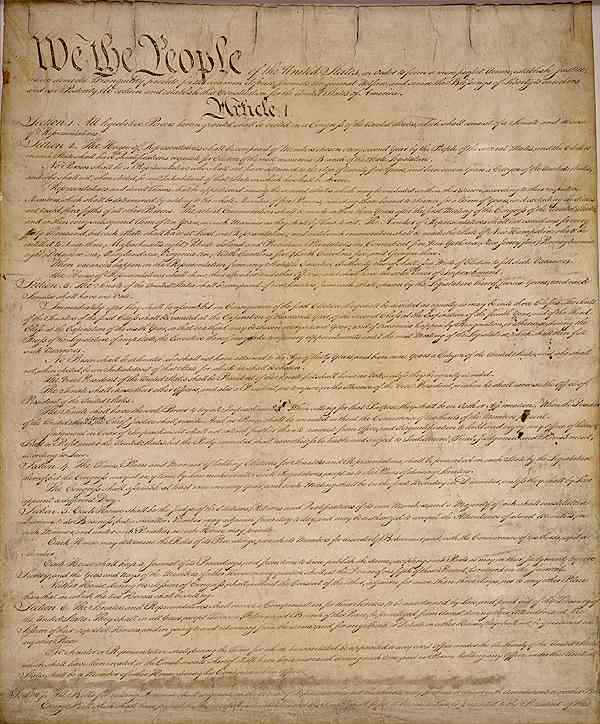
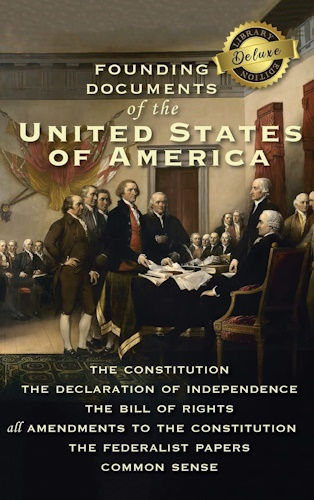
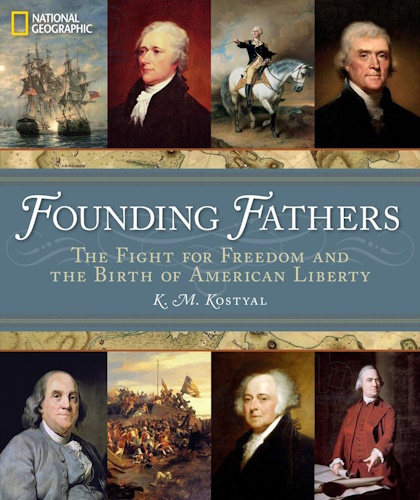
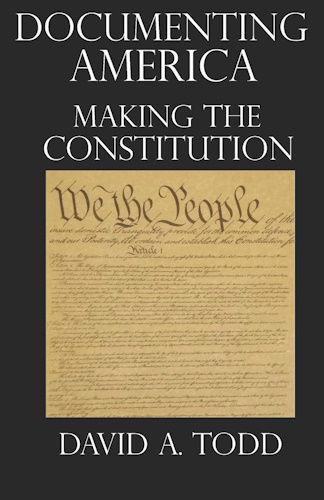


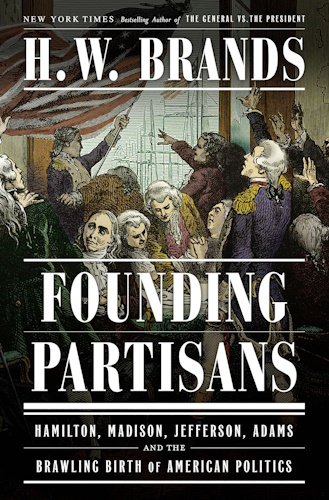
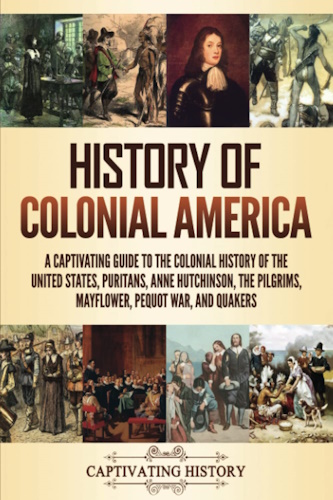
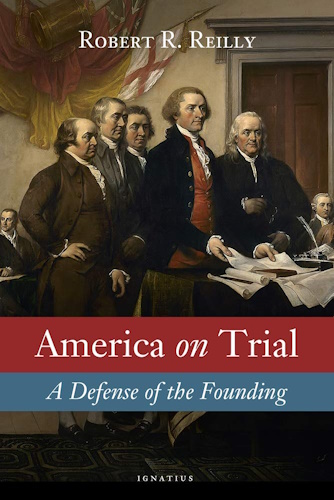
The Constitution For The United States
Its Sources and Its Application
by Thomas James Norton
(Retrieved from archive.org)
The research, work, and dedication
Of
Barefoot Bob Hardison
August 8th, 1933 - January 31st, 2009
![]()
The Constitution For The United States
Its Sources and Its Application
Contents
Preamble
Article 1
Article 2
Article 3
Article 4
Article 5
Article 6
Article 7
Ratification
First 12 Amendment Proposals
"Bill of Rights" Amend. I - X
Amend. XI -XXVII
Missing Original 13th Amendment
Letter of Transmittal
Landmark Court - Case Index
Constitution History
A Quiz for Loyal Americans
Index
Index to Landmark Court Cases
Expounding the Constitution
A LIST OF THE LEADING CASES EXPOUNDING THE CONSTITUTION,
WITH NOTES INDICATING THE TENOR OF EACH CASE
A
- ACCUSED, See Criminal Procedure
- ALIEN,
- entitled to equal protection as though citizen.
- Truax v. Raich (1915), 239 U.S. 33, ref. Amend.,Art.14,Sect.1,Cl.3
- naturalization of, may be revoked for disloyalty.
- United States v. Herberger (1921), 272 Fed. 278, ref. Art.1,Sect.8,Cl.6
- ALIEN CONTRACT LABOR LAW,
- held not to exclude minister of gospel.
- Church of the Holy Trinity v. United States (1892), 143 U. S. 457, ref. Preamble,Cl.4
- AMENDMENT,
- cannot be ratified by referendum to people.
- Hawke v. Smith (1920), 253 U. S. 221, ref. Art.5,Cl.1
- seven-year limitation of ratification of, not extra constitutional.
- Dillon v. Gloss (1921), 256 U. S. 368 (374), ref. Amend.,Art.18,Sect.3
- XXI gives States power over transportation of liquors unrestricted by Commerce Clause.
- State Board of Equalization of California v. Young's Market Co. (1936), 299 U. S. 59, ref. Amend.,Art.21,Sect.2
B
- BANK OF UNITED STATES,
- Act of Congress creating constitutional.
- McCulloch v. Maryland (1819), 4 Wheat. 316, ref. Art.1,Sect.8,Cl.20
- BANKRUPTCY,
- Act of Congress supersedes State insolvency law.
- Sturges v. Crowninshield (1819), 4 Wheat. 122, ref. Art.1,Sect.8,Cl.7
- debtor imprisoned, released by State but held for debt to Nation.
- United States e. Wilson (1823), 8 Wheat. 253, ref. Art.1,Sect.8,Cl.7
- State cannot release debt owing to citizen of another State.
- Brown v. Smart (1892), 145 U. S. 454, ref. Art.1,Sect.8,Cl.7
- State law may release debtor as to future but not past contract.
- Ogden v Saunders (1827), 12 Wheat. 132 (213), ref. Art.1,Sect.8,Cl.7
- BILL OF ATTAINDER,
- in law of West Virginia.
- Pierce v. Carskadon (1872), 16 Wall 234, ref. Art.1,Sect.9,Cl.3
- in Missouri constitution.
- Cummings v. State (1866), 4 Wall 277, ref. Art.1,Sect.9,Cl.3
- BILL OF RIGHTS IN PHILIPPINES,
- violated by unusual punishment.
- Weems v. United States (1910), 217 U. S. 349, ref. Amend.,Art.8,Cl.3
C
- CHINESE,
- born in United States of permanent resident parents is citizen.
- United States v. Wong Kim Ark (1898), 169 U. S. 649, ref. Amend.,Art.14,Cl.1
- CITIZENSHIP,
- Negro not citizen, therefore without standing in court.
- Dred Scott v. Sandford (1856), 19 How. 393, ref. Amend.,Art.14,Cl.1
- but Fourteenth Amendment made Negro citizen of Nation and State.
- Slaughter-House Cases (1872), 16 Wall. 36, ref. Amend.,Art.14,Cl.1
- CIVIL RIGHTS ACT OF 1875,
- in part unconstitutional.
- Civil Rights Cases (1883), 109 U. S. 3 (24),
- ref.
-
Art.4,Sect.2,Cl.1,
Amend.,Art.13,Sect.2,
Amend.,Art.14,Sect.1,Cl.4,
Amend.,Art.14,Sect.5 - COMMERCE,
- defined and explained by Chief Justice Marshall
- Gibbons v. Ogden (1824), 9 Wheat. 1, ref Art.1,Sect.8,Cl.5
- stamp tax on bill of lading of exports unconstitutional.
- Fairbank v. United States (1901), 181 U. S. 283, ref Art.1,Sect.9,Cl.6
- State cannot prevent piping oil or gas beyond boundary.
- Haskell v. Kansas, etc. (1912), 224 U. S. 217, ref Art.1,Sect.9,Cl.5
- CONFISCATION ACT OF JULY, 1862,
- upheld as constitutional.
- Bigelow v. Forrest (1869), 9 Wall 339; Day v. Micou (1873), 18 WalL 156; Miller v. United States (1870), 11 Wall. 268, ref Art.3,Sect.3,Cl.4
- CONTRACT,
- for slave valid when made could not be impaired by State constitution.
- White v. Hart (1871), 13 Wall. 646, ref Art.1,Sect.10,Cl.2,
- See also Dartmouth College Case
- State cannot impair, by repudiating its bank notes.
- Woodruff v. Trapnall (1850), 10 How. 190, ref Art.1,Sect.10,Cl.2
- nor by withdrawing tax exemption conferred upon Indian land.
- New Jersey v. Wilson (1812), 7 Cranch. 164, ref Art.1,Sect.10,Cl.2
- not impaired by New York rent law.
- Brown v. Feldman (1921), 256 U. S. 170, ref Art.1,Sect.10,Cl.2
- COPYRIGHT CLAUSE,
- does not authorize legislation for trade-marks.
- Trade-Mark Cases (1879), 100 U. S. 82, ref Art.1,Sect.8,Cl.12
- CORPORATION,
- is citizen of State creating it.
- Bank of United States v. Deveaux (1809), 5 Cranch. 61, ref Amend.,Art.14,Sect.1,Cl.2
- not citizen of United States, therefore liberty may be abridged by State.
- Western Turf Assoc.v. Greenberg (1907), 204 U. S. 359, ref Amend.,Art.14,Sect.1,Cl.2
- COURTS,
- can exercise authority only when "case" is brought for relief.
- Osborn v. United States Bank (1824), 9 Wheat. 738 (819), ref Art.3,Sect.2,Cl.1
- not ousted by war except in area of military operations.
- Caldwell v. Parker (1866), 252 U. S. 376), ref Art.3,Sect.2,Cl.12
- not subject to review by referendum to people.
- People v. Western Union (Colorado, 1921), 198 Pac. 146, ref Amend.,Art.14,Sect.1,Cl.3
- CRIMINAL PROCEDURE,
- accused not denied confrontation by reading of testimony of deceased witness in former trial.
- Robertson v. Baldwin (1897), 165 U. S. 275, ref Amend.,Art.6,Sect.1,Cl.3
- dying declaration admissible under Constitution against accused.
- Mattox v. United States (1895), 156 U. S. 237, ref Amend.,Art.6,Sect.1,Cl.3
- editor cannot be tried for criminal libel in foreign district.
- United States v. Smith (1909), 173 Fed. 227, ref Art.3,Sect.2,Cl.13
D
- DARTMOUTH COLLEGE CASE,
- impairing obligation of contract.
- Trustees v. Woodward (1819), 4 Wheat. 463 (518), ref Art.1,Sect.10,Cl.2
- DUE PROCESS OF LAW,
- defined and explained by Supreme Court.
- Murray's Lessee v. Hoboken, etc. (1855), 18 How. 272 (277), ref Amend.,Art.5,Sect.1,Cl.3
- denied by excessive fines.
- Ex parte Young (1908), 209 U. S. 123, ref Amend.,Art.8,Cl.2
- denied by State constitution authorizing referendum on judicial decisions.
- People v. Max (Colorado, 1921), 198 Pac. 150, ref Amend.,Art.14,Sect.1,Cl.3
E
- EDITOR,
- See:
-
Mail;
Newspaper;
Trial - EIGHTEENTH AMENDMENT,
- regular and constitutional. National Prohibition Cases (1920),
- 253 U. S. 350, ref Amend.,Art.18,Sect.1,Cl.1
- seven-year limitation for ratification of, valid.
- Dillon v. Gloss (1921), 256 U. S. 368 (374), ref Amend.,Art.18,Sect.1,Cl.1
- ELECTIONS, CORRUPT PRACTICES IN,
- Act not applicable to primaries.
- Newberry v. United States (1921), 256 U. S. 232, ref Art.1,Sect.4,Cl.1
- United States v. Goodwell (1917), 243 U. S. 476 (489), ref Art.1,Sect.4,Cl.1
- Congress may safeguard voters at.
- Ex parte Siebold (1879), 100 U. S. 371, ref Art.1,Sect.4,Cl.1
- EMANCIPATION PROCLAMATION,
- supplemented and completed by war Amendments
- Slaughter House Cases (1872), 16 Wall. 36 (68), ref Amend.,Art.13,Sect.1,Cl.1
- EQUAL PROTECTION,
- denied by State law requiring eighty per cent employes be native citizens.
- Truax v. Raich (1915), 238 U. S. 33, ref Amend.,Art.14,Sect.1,Cl.2
- not denied by State law restricting use natural gas only one class.
- Walls v Midland (1920), 254 U. S. 300, ref Amend.,Art.14,Sect.1,Cl.4
- not denied to Negro by State law requiring separate railway accommodations.
- Plessy v. Ferguson (1896), 163 U. S. 537, ref Amend.,Art.14,Sect.1,Cl.4
- EXPORTS,
- stamp tax on bill of lading uncostitutional.
- Fairbank v. United States (1901), 181 U.S. 283, ref Art.1,Sect.9,Cl.6
- EX POST FACTO,
- Act of Congress held to be, and void.
- Ex parte Garland (1866), 4 Wall. 333,
- ref.
-
Art.1,Sect.9,Cl.4,
Amend,Art.4,Sect.1,Cl.4 - law defined by Supreme Court.
- Calder v. Bull (1798), 3 Dallas, 386 (390); Cummings v. Missouri (1866), 4 Wall. 277 (325, 326), ref Art.1,Sect.9,Cl.4
- solitary confinement added to death penalty after act committed unconstitutional as.
- Medley, Petitioner (1890), 134 U. S. 160 (171), ref Art.1,Sect.9,Cl.4
- EXTRADITION,
- accused hurried from State on legal papers before time to bring habeas corpus not denied constitutional right.
- Pettibone v. Nichols (1906), 203 U. S. 192, ref Art.4,Sect.2,Cl.4
- nor can one abducted be demanded by asylum State.
- Mahan v. Justice (1888), 127 U. S. 700, ref Art.4,Sect.1,Cl.4
- trial only on charge in demand in international.
- United States v. Rauscher (1886), 119 U. S. 407, ref Art.4,Sect.1,Cl.4
- trial on different charge allowed in interstate.
- Lascelles v. Georgia (1893), 148 U. S. 537, ref Art.4,Sect.1,Cl.4
- provision in Constitution for return of fugitive not mandatory.
- Kentucky v. Dennison (1860), 24 How. 66, ref Art.4,Sect.1,Cl.4
F
- FARCI LOAN BANK ACT OF 1916,
- upheld. Smith v. Kansas City, etc. (1921), 255 U. S. 181, ref Art.1,Sect.8,Cl.5
- FIFTH AMENDMENT,
- not prohibitive of self-incrimination in State court.
- Twining v. New Jersey (1908), 211 U. S. 78, ref Amend,Art.5,Cl.4
- FIFTEENTH AMENDMENT,
- does not confer suffrage but protects existing right.
- United States v. Reese (1875), 92 U. S. 2I4, ref Amend,Art.15,Sect.1,Cl.1
- but when "white" remained in State constitution suffrage necessarily conferred.
- violated by "Grandfather's Clause" in Amendment of 1910 to constitution of Oklahoma.
- Guinn v. United States (1915), 238 U S 347, ref Amend,Art.15,Sect.1,Cl.1
- violated by like clause in law of 1908 of Maryland.
- Myers v. Anderson (1915), 238 U. S. 368, ref Amend,Art.15,Sect.1,Cl.1
- FINES,
- excessive, by State may amount to denial of due process.
- Ex parte Young (1908), 209 U. S. 123, ref Amend,Art.8,Cl.2
- excessive, not prohibited as such to States by Eighth Amendment.
- Waters-Pierce etc. v. Texas (1909), 212 U. S. 86; O'Neill v. Vermont (1892), 144 U. S. 323 (332), ref Amend,Art.8,Cl.2
- FOOD CONTROL ACT OF 1917,
- penal provisions void for indefiniteness.
- United States v. Cohen (1921), 255 U. S. 81, ref Amend,Art.6,Cl.2
- FOURTEENTH AMENDMENT,
- distinguishes between State and National citizenship.
- Slaughter-House Cases (1872), 16 Wall. 36 (72), ref Amend,Art.14,Sect.1,Cl.1
- Chinese born in United States of permanent resident parents citizen under.
- United States v. Wong Kim Ark (1898), 169 U. S. 649, ref Amend,Art.14,Sect.1,Cl.1
- not intended to transfer protection of all civil rights to Nation.
- Slaughter-House Cases (1872),16 Wall 36 (77), ref Amend,Art.14,Sect.1,Cl.1
- protects others with liberated Negro.
- Buchanan v. Warley (1917), 245 U. S. 60, ref Amend,Art.14,Sect.1,Cl.1
- reason for, stated by Supreme Court.
- Slaughter-House Cases (1872), 16 Wall. 36 (70), ref Amend,Art.14,Sect.1,Cl.1
- violated by Arizona Initiative Law of 1915 requiring 80 percent employes be native citizens.
- Truax v. Raich (1915), 239 U. S. 33, ref Amend,Art.14,Sect.1,Cl.3
- See also:
-
Citizenship;
Labor;
Woman - FREEDOM OF SPEECH AND PRINTING,
- cannot extend to resistance to laws in time of war.
-
Schenck v. United States (1919), 249 U. S. 47;
Schaefer v. United States (1920), 251 U. S. 466;
Pierce v. United States (1920), 252 U. S 239, ref Amend,Art.1,Sect.1,Cl.2 - nor to resistance to Nation in time of war under constitution of Minnesota.
- State v. Holm (1918), 139 Minn. 267;167 N. W.181 (1842), 16 Pet. 539, ref Amend,Art.1,Sect.1,Cl.2
- nor does it permit incitement to murder or overthrow of government under constitution of New York.
- People v. Most (1902),171 N. Y. 423, 64 N. E. 175, ref Amend,Art.1,Sect.1,Cl.2
- See also:
-
Mail;
Newspaper - FUGITIVE SLAVE LAW OF 1793,
- was within power of Congress to enact.
- Prigg v. Pennsylvania (1842), 16 Pet. 539, ref Art.4,Sect.2,Cl.3
- See also: SLAVE
G
H
- HOUSE OF REPRESENTATIVES,
- not a court; cannot punish non-member for contempt.
- Kilbourn v. Thompson (1880), 103 U. S. 168; Marshall v. Gordon (1917), 243 U. S. 521, ref Art.1,Sect.5,Cl.2
I
- INCOME TAX,
- Law of 1894 held invalid.
- Pollock v. Farmers' Loan etc. (1895),157 U. S. 429, ref Art.1,Sect.2,Cl.5
- Law of 1913 upheld; taxing power not extended.
- Brushaber v. Union Pacific (1916), 240 U. S. 1, ref Amend,Art.16,Cl.1
- salaries of United States judges not subject to.
- Evans v. Gore (1920), 253 U. S. 245, ref Amend,Art.16,Cl.2
- Foregoing case overruled.
- O'Malley v. Woodrough (1939), 307 U. S. 277,
- ref.
-
Art.3,Sect.1,Cl.2,
Amend,Art.16,Cl.2 - INDICTMENT,
- by grand jury may be dispensed with by State.
- Hurtado v. California (1884), 110 U. S. 516, ref Amend,Art.5,Cl.2
- INSULAR CASES, See Territory.
J
- JUDGES,
- salaries of, not taxable as income.
- Evans v. Gore (1920), 253 U. S. 245, ref Amend,Art.16,Cl.2
- Foregoing case overruled.
- O'Malley v. Woodrough (1939), 307 U.S. 277,
- ref.
-
Art.3,Sect.1,Cl.2,
Amend,Art.16,Cl.2 - JUDICIAL DEPARTMENT,
- cannot interfere with execution of President's power,
- Mississippi v. Johnson (1866), 4 Wall. 475, ref Art.2,Sect.3,Cl.6
- Georgia v. Stanton (1867), 6 Wall. 50 (57), ref Art.4,Sect.4,Cl.1
- JUDICIAL POWER,
- can be exercised only when "case" is brought for relief.
- Osborn v. United States Bank (1824), 9 Wheat. 738 (819), ref Art.3,Sect.2,Cl.1
- JUDICIAL REFERENDUM,
- provision in constitution of Colorado for, void.
- People v. Western Union (1921), 198 Pac. 146, ref Amend,Art.14,Cl.3
- JURY,
- change from twelve to eight invalid as to crime committed before State admitted.
- Thompson v. Utah (1898), 170 U. S. 343, ref Amend,Art.14,Cl.3
- military tribunal cannot displace.
- Ex parte Milligan (1866), 4 Wall. 2 (118), ref Art.3,Sect.2,Cl.12
- of eight persons not prohibited to State courts.
- Maxwell v. Dow (1900), 176 U. S. 581, ref Amend,Art.14,Sect.1,Cl.3
- JURY NULLIFICATION,
- the jury has the right to judge both the law and the facts.
- Georgia v. Brailsford, 3 Dallas 1, 1794
- See also Trial By Jury by Lysander Spooner - (1852).
K
L
- LABOR,
- age of employe may be limited.
- Sturgis v. Beauchamp (1913), 231 U. S. 320, ref Amend,Art.14,Sect.1,Cl.3
- and length of day may be limited.
- Atkin v. Kansas (1903), 191 U. S. 207, ref Amend,Art.14,Sect.1,Cl.2
- hours of, in mines and smelters may be limited by State.
- Holden v. Hardy (1898), 169 U. S. 366, ref Amend,Art.14,Sect.1,Cl.2
- hours of, for women may be limited.
- Muller v. Oregon (1908), 208 U. S. 412, ref Amend,Art.14,Sect.1,Cl.3
- hours of, for railway employes may be limited.
- Wilson v. New (191 f), 043 U. S. 332, ref Amend,Art.14,Sect.1,Cl.2
- Law of Oregon of 1916 for ten-hour day upheld.
- Bunting v. Oregon (1917), 243 U. S. 426, ref Amend,Art.14,Sect.1,Cl.2
- laws requiring employer protect employes against machinery and other dangers held constitutional.
- People v. Smith (1896), 108 Mich. 527, 66 N. W. 382 , ref Amend,Art.14,Sect.1,Cl.3
- Minimum Wage Act Congress violative Fifth Amendment.
- Adkins v. Children's Hospital (1923), 261 U. S. 525, ref Amend,Art.5,Cl.6
- Minimum Wage Law for women of Washington valid, overruling Adkins case, above.
- West Coast Hotel Co. v. Parrish (1937), 300 U. S. 379, ref Amend,Art.14,Sect.1,Cl.2
- on public works preference may be given citizen.
- Heim v. McCall (1915), 239 U. S. 175, ref Amend,Art.14,Sect.1,Cl.2
- LEGAL TENDER CASES,
- Brownson v. Rodes (1868), 7 Wall. 229; Hepburn v. Griswold (1870), 8 Wall. 603;
- Knox v. Lee (1870), 12 Wall. 457; Juilliard v. Greenman (1884), 110 U. S. 421,
- ref.
-
Art.3,Sect.8,Cl.5,
Art.3,Sect.8,Cl.10,
Art.3,Sect.1,Cl.1
M
- MAIL,
- disloyal newspapers may be excluded from.
- Milwaukee Pub. Co.v. Burleson (1921), 255 U. S. 407,ref Amend,Art.1,Cl.2
- lotteries may be excluded from.
- Ex parte Jackson (1877), 96 U. S. 727; In re Rapier (1892), 143 U. S. 110,
- ref.
-
Art.1,Sect.8,Cl.12,
Amend,Art.1,Cl.2 - MIGRATORY BIRD CASE,
- showing supremacy of treaty.
- Missouri v. Holland (1920), 252 U. S. 416,ref Art.6,Cl.2, Amend,Art.10,Cl.1
- MILITARY COURT,
- unconstitutional when not in war area.
- Ex parte Milligan (1866), 4 Wall. 2 (118), ref Art.2,Sect.3,Cl.6, Art.3,Sect.2,Cl.12
- MILITIA,
- calling of, determined by President.
- Houston v. Moore (1820), 5 Wheat. 1 (37), ref Art.2,Sect.2,Cl.1
- MONEY,
- Gold contract against public interest; devaluation of dollar legal. Gold Clause Case,
- Norman v. Baltimore & Ohio Railroad Co. (1935) 294 U. S. 240, ref Art.1,Sect.8,Cl.9
N
- NATION,
- cannot take private property without just compensation.
- United States v. Lee (1882), 106 U. S. 196,ref Amend,Art.5,Cl.5
- cannot invade domain of State police power.
- Hammer v. Dagenhart (1918), 247 U. S. 251,ref Amend,Art.7,Cl.1
- NATIONAL COURTS,
- need of, stated by Chief Justice Marshall.
- Bank of United States v. Deveaux (1809), 5 Cranch. 61 (87), ref Art.3,Sect.2,Cl.1
- State cannot tie up non-resident in its own courts.
- Prentis v. Atlantic etc. (1908), 211 U. S. 210, ref Art.3,Sect.2,Cl.7
- NATIONAL INDUSTRIAL RECOVERY ACT,
- violative of Commerce Clause as regulation local production; also against Tenth Amendment.
- Schechter Poultry Corporation v. United States (1935), 295 U. S. 495, ref Art.1,Sect.8,Cl.6
- NATIONAL LABOR RELATIONS ACT,
- valid legislation under Commerce Clause in protection of labor.
- National Labor Relations Board v. Jones & Laughlin Steel Co. (1937); 301 U. S. 1, ref Art.1,Sect.8,Cl.6
- NATIONAL OFFICERS,
- triable in Federal not State court for act committed in line of duty.
- In re Neagle (1890), 135 U. S. 1, ref Art.2,Sect.3,Cl.6
- NATIONAL PROHIBITION CASES, (1920) ,
- 253 U. S. 350, ref Art.5,Cl.1
- NATURALIZATION,
- may be revoked for disloyal utterances.
- United States v. Herberger (1921), 272 Fed. 278, ref Art.1,Sect.8,Cl.8
- NEGRO,
- cannot be excluded by ordinance from city block occupied by whites.
- Buchanan v. Warley (1917), 245 U. S. 60, ref Amend,Art.14,Sect.1,Cl.4
- such restriction valid when condition in deed.
- Los Angeles v. Gary (1920), 181 Calif. 680, 186 Pac. 596, ref Amend,Art.14,Sect.1,Cl.4
- not denied equal protection by State law requiring separate railway accommodations.
- Plessy v. Ferguson (1896), 163 U. S. 537, ref Amend,Art.14,Sect.1,Cl.4
- See also:
-
Fifteenth Amendment;
Fourteenth Amendment;
Thirteenth Amendment - NEWSPAPER,
- violating National Defense Act excluded from mail.
- Milwaukee Pub. Co. v. Burleson (1921), 255 U. S. 407, ref Amend,Art.1,Cl.2
O
P
- PARDON,
- President's power of, beyond control of Congress.
- The Laura (1885), 114 U. S. 411 (413), ref Art.2,Sect.2,Cl.3
- PATENT,
- to inventor of grain reaping machine,
- Seymour v. McCorrnick (1853), 16 How. 480, ref Art.1,Sect.8,Cl.13
- to inventor of magnetic telegraph,
- O'Reilly v. Morse (1853), 15 How. 62, ref Art.1,Sect.8,Cl.13
- PATENTEE,
- cannot control price after sale by him.
- Boston Store v. American Graphophone (1918), 246 U. S. 8, ref Art.1,Sect.8,Cl.12
- POLICE POWER,
- State may extend, to damage or destruction of property.
- Mugler v. Kansas (1887), 123 U. S. 623, ref Art.1,Sect.10,Cl.5
- POLYGAMY,
- suppression of, not interference with religious freedom.
- Mormon Church v. United States (1890), 136 U. S. 1 (49), ref Amend,Art.1,Cl.1
- POWER RESERVED BY STATES,
- Chicago etc. v. McGuire (1911), 219 U. S. 549, ref Amend,Art.10,Cl.1
- Gordon v. United States (1864), 117 U S. 697 (703), ref Amend,Art.10,Cl.1
- PREAMBLE,
- although indicating general purpose not source of power.
- Jacobson v. Massachusetts (1905), 197 U. S. 11 (22), ref Art.1,Sect.1,Cl.1
- PRESIDENT,
- courts will not restrain execution of powers of.
- Mississippi v. Johnson (1866), 4 Wall. 475, ref Art.2,Sect.3,Cl.6
- Georgia v. Stanton (1867), 6 Wall. 50 (57), ref Art.2,Sect.4,Cl.1
- enforces, but cannot make laws.
- Ex parte Milligan (1866), 4 Wall. 2 (118), ref Art.2,Sect.3,Cl.6
- PRIVILEGES AND IMMUNITIES,
- of citizens defined.
- Corfield v. Coryell (1823), 4 Wash. CC. 371; Slaughter-House Cases (1872), 16 Wall. 36 (76), ref Art.4,Sect.1,Cl.3, ref Amend,Art.14,Cl.2
- abridged by State constitution requiring 80 per cent native employes in mines and smelters.
- Truax v. Raich (1915), 239 U S 33, ref Amend,Art.14,Cl.3
- PROPERTY DEVOTED TO PUBLIC USE,
- public acquire interest in.
- Munn v. Illinois (1876), 94 U. S. 113, ref Art.1,Sect.10,Cl.2
- PROPERTY TAKEN FOR PUBLIC USE,
- just compensation necessary for.
- United States v. Lee (1882), 106 U. S. 196, ref Amend,Art.5,Cl.6
- PUBLIC POLICY OF STATE,
- when against full faith and credit.
- Andrews v. Andrews (1903), 188 U. S. 14, ref Art.4,Sect.1,Cl.1
- PUNISHMENT,
- by excessive fines unconstitutional
- State v. Ross (1910), 55 Ore. 450, 106 Pac. 1022, ref Amend,Art.8,Cl.3
- electrocution not cruel.
- Malloy v. South Carolina (1915), 237 U.S.180, ref Art.1,Sect.9,Cl.4
- under State law debarring accused from occupation unusual and therefore unconstitutional.
- People v. Haug (1888), 68 Mich. 349, ref Amend,Art.8,Cl.2
- See also:
- Bill of Rights.
Q
R
- RATIFICATION,
- referendum cannot be used in, of amendment.
- National Prohibition Cases (1920), 253 U. S. 350, ref Art.5,Cl.1
- State cannot revoke.
- Opinion of the Justices (Maine, 1919), 118 Me, 544, 107 Atl. 673ref Art.5,Cl.1
- time limit for, of Eighteenth Amendment valid.
- Dillon v. Gloss (1921), 256 U. S. 368, ref Amend,Art.18,Cl.2
- RELATIONS BETWEEN THE STATES,
- chief purpose of adoption of Constitution to bring about harmonious. Ableman v. Booth (1858), 21 How. 506 (517), ref Art.3,Sect.2,Cl.7
- RELIGIOUS FREEDOM,
- not justification for polygamy.
- Mormon Church v. United States (1890), 136 U. S, 1 (49), ref Amend,Art.1,Cl.1
- RENT,
- regulating law of New York upheld as not taking property.
- Brown Company v. Feldman (1921), 256 U. S. 170, ref Art.1,Sect.10,Cl.2
- REPUBLICAN FORM OF GOVERNMENT,
- what constitutes, a political not a judicial question.
- Luther v. Borden (1848), 7 How. 1; Georgia v. Stanton (1867), 6 Wall.50 (57); Pacific States etc. v. Oregon (1912), 223 U. S. 118, ref Art.4,Sect.4,Cl.1
S
- SEARCH AND SEIZURE,
- Act of Congress requiring private books and papers in evidence void.
- Boyd v. United States (1886), 116 U. S. 616, ref Amend,Art.4,Cl.1
- information gained by illegal seizure of books cannot support later demand.
- Silverthorne etc. v. United States (1920), 251 U. S. 385, ref Amend,Art.4,Cl.1
- mail can be opened by Government only in accordance with Constitution.
- Ex parte Jackson (1877), 96 U. S. 727, ref Amend,Art.1,Cl.2
- must conform strictly to constitutional requirements.
- Gouled v. United States (1921), 255 U. S. 298; Amos v. United States (1921), 255 U. S. 313, ref Amend,Art.5,Cl.5
- SELF-INCRIMINATION,
- See Fifth Amendment
- SLAVE,
- taken to England became a free man.
- Somerset's Case (1772),Lofft's Report, 1; 20 Howell's State Trials, 79, ref Art.4,Sect.2,Cl.3
- See also Fugitive Slave Law.
- SOCIAL SECURITY ACT,
- Act of Congress levying percentage taxes on employer according to annual earnings employe; and making appropriations to States in aid unemployment administration, valid under General Welfare Clause.
- Steward Machine Co. v. Davis, Collector of Internal Revenue (1937), 301 U. S. 548, ref Art.1,Sect.8,Cl.3
- SOLITARY CONFINEMENT,
- added to death penalty after act committed unconstitutional as ex post facto.
- Medley, Petitioner (1890), 134 U. S. 160 (171), ref Art.1,Sect.9,Cl.4
- STATE,
- boundaries and other controversies between States made justiciable by Constitution.
- Florida v. Georgia (1854), 17 How. 478 (494); Rhode Island v. Massachusetts (1838), 12 Pet. 657 (720), ref Art.3,Sect.2,Cl.5
- cannot prevent citizen from using National courts.
- Prentis v. Atlantic etc. (1908), 211 U. S. 210 (228), ref Art.3,Sect.2,Cl.7
- cannot release National prisoner by habeas corpus.
- Ableman v. Booth (1858), 21 How. 506, ref Art.2,Sect.3,Cl.6, Art.3,Sect.2,Cl.7
- cannot require detour interstate train over branch line already served.
- St. Louis etc. v. Public Ser. Com. (1921), 254 U. S. 535, ref Art.1,Sect.8,Cl.6
- cannot sue Nation when consent not given.
- Kansas v. United States (1907), 204 U. S. 331, ref Art.3,Sect.2,Cl.4
- cannot try National officer for act committed in line of duty.
- In re Neagle (1890), 135 U. S. 1, ref Art.2,Sect.3,Cl.6
- cannot be sued without its consent.
- Smith v. Reeves (1900), 178 U. S. 436, ref Art.3,Sect.2,Cl.6
- STATE PRIDE,
- not offended by National sovereignty.
- Ableman v. Booth (1858), 21 How. 506 (524), ref Art.6,Cl.2, Art.6,Cl.4
- SUIT,
- against State maintainable by citizen of another State.
- Chisholm v. Georgia (1793), 2 Dallas, 419, ref Art.3,Sect.2,Cl.6
- but not since adoption of Eleventh Amendment.
- Hollingsworth v. Virginia (1798), 3 Dallas, 378, ref Art.3,Sect.2,Cl.6
- SUPREME COURT,
- has original jurisdiction of controversies between States.
- Kansas v. Colorado (1907), 206 U. S. 46; Missouri v. Illinois etc. (1906), 200 U. S. 496, ref Art.3,Sect.2,Cl.5
- States have bound themselves to submit to decisions of.
- Ableman v. Booth (1858), 21 How. 506 (519), ref Art.3,Sect.2,Cl.5, Art.6,Cl.4
- SUPREME LAW,
- Constitution invalidates all conflicting laws.
- National Prohibition cases (1920), 253 U. S. 350, ref Art.6,Cl.2
- Treaty is, prevailing over States.
- Missouri v. Holland (1920), 252 U. S. 416, ref Art.6,Cl.2
- SYNDICALISM,
- Act of Oregon (1933) invalid as making crime of peaceable assembly for lawful discussion.
- De Jonge v. Oregon (1937), 299 U S 353, ref Amend,Art.1,Cl.3
T
- TENURE OF OFFICE ACT,
- and repeal discussed by Supreme Court.
- Parsons v. United States (1897), 167 U. S. 324 ref Art.1,Sect.2,Cl.12
- TERRITORY,
- new, comes in only by Act of Congress.
- Insular Cases, 182 U. S. 1; 183 U. S. 176; 190 U. S. 197; 195 U. S. 138; 197 U. S. 516, ref Art.1,Sect.8,Cl.16
- THIRTEENTH AMENDMENT,
- denounces all personal servitudes as well as slavery.
- Slaughter-House Cases (1872), 16 Wall 36, ref Amend,Art.13,Sect.1,Cl.1
- not violated by law for compulsory work on roads
- Butler v. Perry (1916), 240 U. S. 328, ref Amend,Art.13,Sect.1,Cl.1
- profound effect of, stated by Court.
- United States v. Rhodes (1866), 27 Federal Cases No. 16151, ref Amend,Art.13,Sect.1,Cl.1
- violated by law making criminal a refusal to perform contract to labor.
- Bailey v. Alabama (1911), 219 U. S. 219, ref Amend,Art.13,Sect.1,Cl.1
- violated by State law requiring one convicted to work out fine for bondsman.
- United States v. Reynolds (1914), 235 U. S. 133, ref Amend,Art.13,Sect.1,Cl.1
- TRADE-MARK,
- legislation not authorized by Copyright clause.
- Trade-Mark Cases (1879), 100 U. S. 82, ref Art.1,Sect.8,Cl.16
- TREATY,
- is supreme law prevailing over States.
- Missouri v. Holland (1920), 252 U. S. 416, ref Art.6,Cl.2, Amend,Art.10,Cl.1
- TREASON,
- and overt act discussed by Chief Justice Marshall.
- United States v. Burr 1807), 25 Federal Cases Nos. 14692 et seq., ref Art.3,Sect.3,Cl.1
- TRIAL,
- editor cannot be taken to distant district for.
- United States v. Smith (1909), 173 Fed. 227, ref Art.3,Sect.2,Cl.13
- leader of insurrection may be imprisoned without.
- Moyer v. Peabody (1909), 212 U. S. 78 (84), ref Amend,Art.6,Cl.1
U
- UNITED STATES,
- cannot be sued without its consent.
- Louisiana v. McAdoo (1914), 234 U.S.627, ref Art.3,Sect.2,Cl.4
V
- VOTE,
- right to, comes from State; protection to, from Nation.
- Minor v. Happersett (1874), 21 Wall. 162, ref Amend,Art.14,Sect.1,Cl.1
- United States v. Cruikshank (1875), 92 U. S. 542 (556), ref Amend,Art.15,Sect.1,Cl.1
W
- WAR,
- does not oust courts except in area of military occupation.
- Caldwell v. Parker (1920), 252 U. S. 376ref Art.3,Sect.2,Cl.12
- WOMAN,
- did not receive privilege of voting through Fourteenth Amendment.
- Minor v. Happersett (1874), 21 Wall 162, ref Amend,Art.14,Sect.1,Cl.1
- marrying alien loses citizenship although remaining a resident.
- Mackenzie v. Hare (1915), 239 U. S. 299, ref Amend,Art.14,Sect.1,Cl.1
- WORKMEN'S COMPENSATION LAW,
- of State need not give jury trial.
- Hanna v. Bleakly (1917), 243 U. S. 210; New York Central etc. v. White (1917), 243 U. S. 188, ref Amend,Art.7,Cl.1
- WYOMING,
- law of, conserving natural gas not denial of equal protection.
- Walla v. Midland (1920), 254 U. S. 300, ref Amend,Art.14,Sect.1,Cl.4
X
Y
Z
![]()
![]()
![]()
Disclaimer:
Some material presented will contain links, quotes, ideologies, etc., the contents of which should be understood to first, in their whole, reflect the views or opinions of their editors, and second, are used in my personal research as "fair use" sources only, and not espousement one way or the other. Researching for 'truth' leads one all over the place...a piece here, a piece there. As a researcher, I hunt, gather and disassemble resources, trying to put all the pieces into a coherent and logical whole. I encourage you to do the same. And please remember, these pages are only my effort to collect all the pieces I can find and see if they properly fit into the 'reality aggregate'.
Personal Position:
I've come to realize that 'truth' boils down to what we 'believe' the facts we've gathered point to. We only 'know' what we've 'experienced' firsthand. Everything else - what we read, what we watch, what we hear - is what someone else's gathered facts point to and 'they' 'believe' is 'truth', so that 'truth' seems to change in direct proportion to newly gathered facts divided by applied plausibility. Though I believe there is 'truth', until someone representing the celestial realm visibly appears and presents the heavenly records of Facts And Lies In The Order They Happened, I can't know for sure exactly what "the whole truth' on any given subject is, and what applies to me applies to everyone. Until then I'll continue to ask, "what does The Urantia Book say on the subject?"
~Gail Bird Allen
![]()
![]()








-
Urantia Book, 44:0.11 - The Celestial Artisans
Never in your long ascendancy will you lose the power to recognize your associates of former existences. Always, as you ascend inward in the scale of life, will you retain the ability to recognize and fraternize with the fellow beings of your previous and lower levels of experience. Each new translation or resurrection will add one more group of spirit beings to your vision range without in the least depriving you of the ability to recognize your friends and fellows of former estates.
-
Princess Bride 1987 Wallace Shawn (Vizzini) and Mandy Patinkin (Inigo Montoya)
Vizzini: HE DIDN'T FALL? INCONCEIVABLE.
Inigo Montoya: You keep using that word. I do not think it means what you think it means. -
Urantia Book, 117:4.14 - The Finite God
And here is mystery: The more closely man approaches God through love, the greater the reality -- actuality -- of that man. The more man withdraws from God, the more nearly he approaches nonreality -- cessation of existence. When man consecrates his will to the doing of the Father's will, when man gives God all that he has, then does God make that man more than he is.
-
Urantia Book, 167:7.4 - The Talk About Angels
"And do you not remember that I said to you once before that, if you had your spiritual eyes anointed, you would then see the heavens opened and behold the angels of God ascending and descending? It is by the ministry of the angels that one world may be kept in touch with other worlds, for have I not repeatedly told you that I have other sheep not of this fold?"
-
Urantia Book, Foreword - 0:12.12 - The Trinities
But we know that there dwells within the human mind a fragment of God, and that there sojourns with the human soul the Spirit of Truth; and we further know that these spirit forces conspire to enable material man to grasp the reality of spiritual values and to comprehend the philosophy of universe meanings. But even more certainly we know that these spirits of the Divine Presence are able to assist man in the spiritual appropriation of all truth contributory to the enhancement of the ever-progressing reality of personal religious experience—God-consciousness.
-
Urantia Book, 1:4.3 - The Mystery Of God
When you are through down here, when your course has been run in temporary form on earth, when your trial trip in the flesh is finished, when the dust that composes the mortal tabernacle "returns to the earth whence it came"; then, it is revealed, the indwelling "Spirit shall return to God who gave it." There sojourns within each moral being of this planet a fragment of God, a part and parcel of divinity. It is not yet yours by right of possession, but it is designedly intended to be one with you if you survive the mortal existence.
-
Urantia Book, 1:4.1 - The Mystery Of God
And the greatest of all the unfathomable mysteries of God is the phenomenon of the divine indwelling of mortal minds. The manner in which the Universal Father sojourns with the creatures of time is the most profound of all universe mysteries; the divine presence in the mind of man is the mystery of mysteries.
-
Urantia Book, 1:4.6 - The Mystery Of God
To every spirit being and to every mortal creature in every sphere and on every world of the universe of universes, the Universal Father reveals all of his gracious and divine self that can be discerned or comprehended by such spirit beings and by such mortal creatures. God is no respecter of persons, either spiritual or material. The divine presence which any child of the universe enjoys at any given moment is limited only by the capacity of such a creature to receive and to discern the spirit actualities of the supermaterial world.
-
Urantia Book, 11:0.1 - The Eternal Isle Of Paradise
Paradise is the eternal center of the universe of universes and the abiding place of the Universal Father, the Eternal Son, the Infinite Spirit, and their divine co-ordinates and associates. This central Isle is the most gigantic organized body of cosmic reality in all the master universe. Paradise is a material sphere as well as a spiritual abode. All of the intelligent creation of the Universal Father is domiciled on material abodes; hence must the absolute controlling center also be material, literal. And again it should be reiterated that spirit things and spiritual beings are real.
-
Urantia Book, 50:6.4 - Planetary Culture
Culture presupposes quality of mind; culture cannot be enhanced unless mind is elevated. Superior intellect will seek a noble culture and find some way to attain such a goal. Inferior minds will spurn the highest culture even when presented to them ready-made.
-
Urantia Book, 54:1.6 - True And False Liberty
True liberty is the associate of genuine self-respect; false liberty is the consort of self-admiration. True liberty is the fruit of self-control; false liberty, the assumption of self-assertion. Self-control leads to altruistic service; self-admiration tends towards the exploitation of others for the selfish aggrandizement of such a mistaken individual as is willing to sacrifice righteous attainment for the sake of possessing unjust power over his fellow beings.
-
Urantia Book, 54:1.9 - True And False Liberty
How dare the self-willed creature encroach upon the rights of his fellows in the name of personal liberty when the Supreme Rulers of the universe stand back in merciful respect for these prerogatives of will and potentials of personality! No being, in the exercise of his supposed personal liberty, has a right to deprive any other being of those privileges of existence conferred by the Creators and duly respected by all their loyal associates, subordinates, and subjects.
-
Urantia Book, 54:1.8 - True And False Liberty
There is no error greater than that species of self-deception which leads intelligent beings to crave the exercise of power over other beings for the purpose of depriving these persons of their natural liberties. The golden rule of human fairness cries out against all such fraud, unfairness, selfishness, and unrighteousness.

